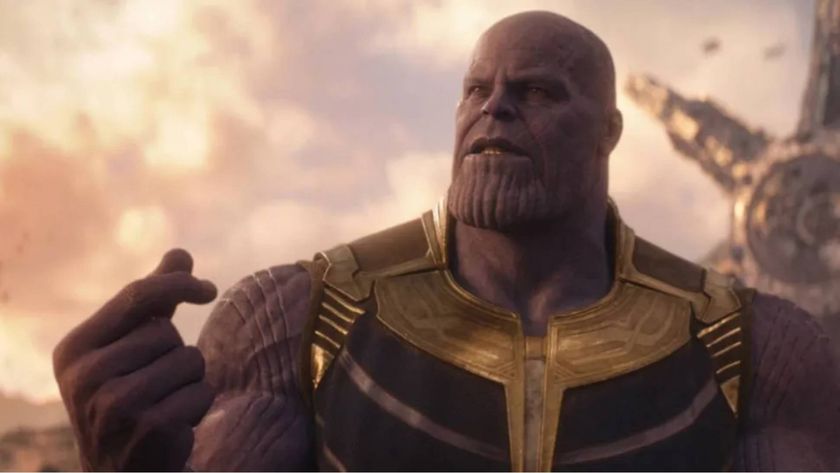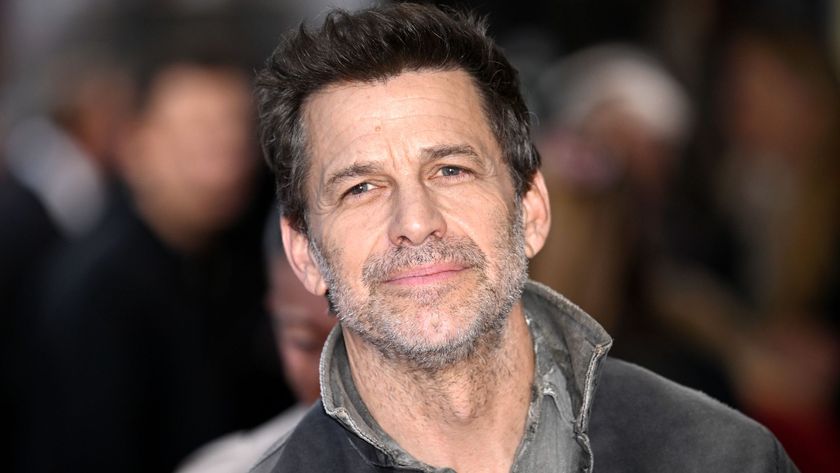11 Sci-Fi shows that floundered under replacement showrunners

Some shows are showrunner proof Others are not
No need to get all huffy in the comments section. Were not suggesting that The Walking Dead has taken a nosedive in quality. The exact opposite in fact its the prefect proof that a change in showrunners doesnt always mean a shows in trouble. Hell, in the case of The Walking Dead youd assume from the amount of showrunners that its got through the quality of the show must be suffering but far from it the viewing figures are piling up faster than the corpses.
Sadly the opposite is all too common. There is a history of new producers coming in with new ideas and an it aint broke but Im gonna fix it anyway philosophy, making major changes and ruining the show. Or worse, original showrunners being sacked because of artistic differences and being replaced by yes men who capitulate to the networks or the stars egos.
Here are some of the best/worst examples from sci-fi and fantasy telly.
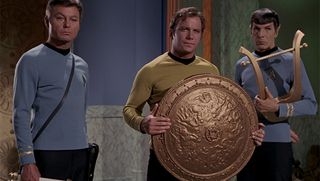
Star Trek
Within sci-fi circles in the 70s, Fred Freiberger became known as The Series Killer, as he managed to take over as producer for the final seasons on no less than three beloved science fiction series (well reveal the others in the coming pages). He may, actually, have been a great TV producer in an alternate universe where networks didnt keep giving him sci-fi projects to ruin. Sadly they did, which was odd considering that he clearly thought the entire genre began and finished with 50s B-movies monsters, action, dopey concepts and cheesy dire-logue.
To be fair, when he was brought on the third series of Star Trek the show was already struggling in the ratings. Instead of attracting new viewers to the show, though, Freibergers approach seemed carefully designed to kill off any fans of the show still watching.
Starting off with Spocks Brain (in which, yes Spocks brain is removed) and ending with Kirks consciousness becoming trapped in the body of a woman, this was a season hobbled by unrelenting silliness, dancing dwarves and Spock having multiple emotional lapses (because seeing Spock doing emotional things was funny, right?).
There were many behind-the-scenes problem Freiberger had to deal with (budgets were slashed, the shows creator and original producer Gene Roddenberrys increasingly bizarre decisions had alienated many of Treks former top writers and script editors) which has led many fans to downplay his part in the shows downfall. Admittedly there were a handful of great episodes in his season, too. But crucially you need to take into account his subsequent series killing form and conclude, yeahmaybe he wasnt the best man for the job.
He possibly thought the same in retrospect. In a 1991 interview he said, I thought the worst experience of my life was when I was shot down over Nazi Germany Then I joined Star Trek. I was only in a prison camp for two years, but my travail with Star Trek has lasted 25 years... and counting.
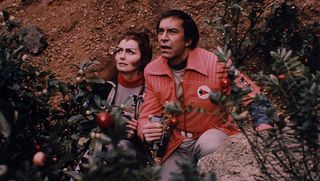
Space: 1999
You have to wonder how the interview went when Gerry Anderson was considering enticing Fred Freiberger to the UK to produce the second season of Space: 1999 in the mid 70s.
Gerry: So what experience do you have in producing science fiction, Mr Freiberger?
Fred: I killed off Star Trek by making it silly.
Gerry: And what is your vision for Space: 1999?
Fred: Pretty much the same. Only with more monsters.
Gerry: When can you start?
And so the theme tune was changed, the cast was changed, an alien shapeshifter became a regular character, signs were spelt in American English, actors ran along corridors about three times more often per episode and silly-looking monsters multiplied like rabbits. Freiberger even wrote three episodes himself, which led to an alien planet being called "Luton because he passed a sign for the English town on the way to work one morning and thought it sounded exotic.
And if youre thinking were exaggerating about the monsters, just wait till you see the next page

Space: 1999 Season 2 Monsters
Well, some of them at least.
For the record, Freiberger also killed off The Six Million Dollar Man when he was brought in to produce the fifth season in 1977. The problem this time wasnt too many monsters (though he did bring back Bigfoot from earlier seasons) but too many two-parters and too many sequels to earlier episodes, all of which gave the distinct impression of a series running out of ideas and money. Again, it could be argued that cancellation was beyond Freibergers control (it looked like a show the network had lost interest in) but he hardly produced episodes that would convince anyone to change their minds.
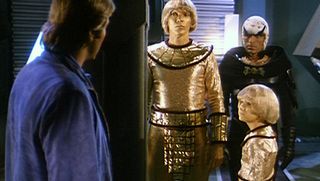
Buck Rogers in the 25th Century
Few shows have undergone such a radical overhaul as Buck Rogers In The 25th Century did with its second season. In its first year the show had been an unashamed Star Wars rip-off, a cheesy action adventure with Buck leading the fight for Earth against alien aggressors.
Season two was a poor mans Star Trek. Worse, a poor mans Star Trek season three. Kids tuning in expecting dog fights and laser battles instead found themselves watching a show about a group of explorers on a spaceship in high-concept episodes about races that ages backwards and space goblins. Dads tuning in for Wilma Deerings tight-fitting trews instead found her in a bizarre air-hostess outfit. Twiki lost his comedy biddi biddi biddi voice (until a fan outcry had it reinstated). There was a new robot that looked like a lamppost. Some old guy in a cardigan regularly wandered on the bridge looking like he wasnt sure what show he was in. There was an alien birdman with a hairpiece that looked as if it was made from pigeon droppings
And it was pretty dull.
The changes were the result of new producer John Mantley, who had previously worked primarily in Western series such as Rawhide and Gunsmoke. As such his vision for Buck seemed to be the wagon train to the stars concept that Gene Roddenberry originally envisioned for Star Trek and in publicity interviews he made a big deal about how he wanted the show to be about human beings. There were a few decent episodes but in general the target audience really wanted the show to be about spaceships blasting the hell out of each other.
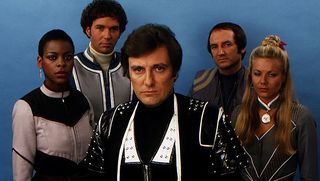
Blakes Seven
When former director Vere Lorrimer took over as producer on the fourth series of Blakes Seven the odds were stacked against him. It was obvious that the production team was as surprised as anyone that the BBC commissioned another series from the way series three ended with the shows central ship, the Liberator, destroyed and its main villain, Servalan, apparently killed.
The decision on series four was so unexpected that the shows original producer, David Maloney, was not available. Lorrimer stepped in and had to reinvent the show. There was a new ship, the Scorpio, with a new on-board AI computer, Slave. There wasnt a new villain, he just resurrected the old one, and had her galavanting around the universe under a pseudonym. There was a new base too Blakes rebels had never had a base before and a new gunslinging female member of the Seven, Soolin, whose entire character notes seemed to comprise a Post-It saying, She has a gun.
What Lorrimer did well was make the show look less cheap. The sets didnt wobble as much, the FX in general looked much better. Unfortunately he took all the fun out of the show as well. The new ship was a flying wedge; inside it was drab with a design aesthetic of a Portaloo. The stories were plodding; a lot of them felt like rehashed versions of earlier episodes and many were formulaic. The characters all became very earnest.
It was far from a disaster but it lacked spark and felt like a show that didnt quite know what to do with its borrowed time. Apart from the final episode which was utterly magnificent and, ironically, was a much more memorable way to end the show than series threes finale had been. Kill all the heroes? Thats how TV legends are created.

Doctor Who
Most producers in this feature managed to kill their inherited children in one season. For classic Doctor Who though, it was a long, slow, painful death under John Nathan Turner who presided over stories for four different Doctors.
Oddly, he was regarded as a bit of a saviour when he first took on the role for Tom Bakers final series in 1980. He was lauded for making the show more serious, less silly, more hard SF. The previous producer, Graham Williams, having been told to tone down the gothic horror of Bakers early seasons, had taken the show ever more down the college humour route, culminating in series with Douglas Adams as script editor that bordered on The Doctor At The Edinburgh Fringe at times. JNT (as he was affectionately known) changed all that with a show aimed squarely at geeky teenage boys, a demographic that hated anything silly.
In retrospect now, though, you can see the seed of what went wrong with the show in the final Baker season. Sure, it was more serious sci-fi, but it was also just a tad dull. Baker, told to tone down his ab-libbing excesses, seems in a constant grump. His witty, carefree assistant Romana (another Time Lord) and the robot dog K9 are replaced by Team Whinge a trio of young companions who just seemed to argue a lot. The sci-fi concepts are often great, but the storytelling is often leaden and repetitive.
No worries, there was a fresh Doctor on the way, and the youthful Peter Davison was certainly a radical departure. Davison actually made a fine Doctor, and there were a number of great stories in his era, but in general the episodes were still a little bland. Bland, however, was preferable to what came next.
Colin Baker may well have made a good Doctor but well never know. Because JNT dictated all aspects of his performance from obnoxious personality to clown costume and the result was a Doctor who was, simply, an effort to watch. Then after the show was cancelled for the first time, JNT brought it back with the ill-advised Trial Of A Time Lord series a 14-episode folly with the stories forming the evidence in a bloated courtroom scenario. It should have been epic. Instead it was a confusing, cheap-looking non-event.
The end of that season introduced Bonnie Langford as companion, indicative of JNTs love of guest stars that only he could ever get excited by (see also Stubby Kaye, Dolores Gray and Ken Dodd). To many viewers, they were more a reason to turn off.
Sadly, that was also the case with his final choice of Doctor, Sylvester McCoy, who, as it turns out, made a great Doctor. But to the general viewing public he was that goon from Tiswas who puts ferrets down his trousers. He was hardly a reason for the disaffected to tune in, and it was difficult for fans to convince them otherwise.
Ironically the final series of classic Who was the best, wittiest and most adventurous in years but it was too little too late. Years of mismanagement, and a belief that getting publicity was more important than paying attention to the writing, meant the shows reputation was in the doldrums.
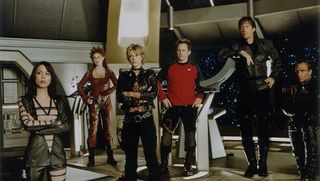
Andromeda
Gene Roddenberrys Andromeda was another show that suffered a long, slow death (this time over three and a half seasons), though this time the blame was not so much with the replacement showrunners as with the star, Kevin Sorbo. When he signed on for the space opera (a kind of Blakes Seven-with-a-budget) he nabbed himself a producer credit too and this was to prove crucial.
The original showrunner was Robert Hewitt Wolfe of Deep Space Nine fame. He had a grand plan that involved a massive story arc and intelligent storytelling. Then midway through season two he was sacked.
Why? Well, well let Sorbo explain, shall we? "Robert is a genius, he said in an interview at the time, but was developing stories that were too complicated and too clever for the rest of us to understand.
Well, we dont want intelligent TV, do we?
Wolfe went on internet forums to explain further: Basically, they want the show to be more action-driven, more Dylan-centric, and more episodic. They also want more aliens, more space battles and less internal conflict among the continuity.
What happened next was that Adam Haight, Jaye Firestone and Josanne B Lovick were brought on board to showrun the show the way Sorbo wanted it run which included making him very much the centre of attention. And it went really crap.
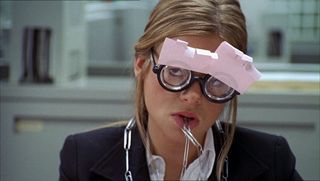
Dead Like Me
Dead Like Me as a series, at least (well try to forget the belated TV movie, Life After Death) never went disastrously downhill. Were including it here, though, simply because creator and original showrunner Bryan Fuller clearly had a very different view of where the show could have gone and its a shame we never saw him put his plans into action.
This was the show about a bunch of Reapers who helped the recently-deceased to pass on. The pilot was full of deliciously black humour, and as we now know from Fullers stint as showrunner on Hannibal he could have gone a lot blacker.
Except he walked off the show in exasperation at interference from production company MGM. The experience with MGM-TV and their lack of professionalism and savvy made it really difficult, he said at the time. It's not like being in Iraq but it was like being at war. I lost weight. I had arguments where they would tell me I didn't know what a pretty woman looks like because I'm a gay man. It was the worst type of gross old boy studio experience you could imagine. They were constantly trying to strong arm me. It was the worst experience of my life."
John Masius and Stephen Godchaux stepped in to fill the breach and they did a decent enough job considering they were forced into the role of yes men. And the show did lose some of its quirkiness. But years later Fuller would still be speaking of Dead Like Me as a missed opportunity, so its hard not to wonder what might have been.

Community
Moses Port and David Guarascio greatest contribution to human history is not getting Community cancelled.
Weve included them here because undeniably season four is by far the worst season of Community. On the other hand its still a) far, far, far superior to the overrated The Big Bang Theory and b) they kept the show going while the spat between show creator Dan Harmon and the network was resolved. So we should be thanking them. Things could have been far, far worse.
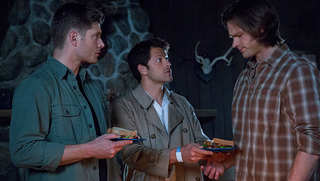
Supernatural
Heres another show that survived a shaky period under a replacement showrunner. Eric Kripke had been at the helm of the first five seasons and during that time Sera Gamble had provided some great scripts for the show. But when she became showrunner for seasons six and seven, the fans went into a right old tizz as the show seemed to move away from its core values.
Yes, Gamble had the temerity to downplay the relationship between the Winchester brothers and big-up new characters shed introduced. She also seemed to think that the angel Castiel was the star of the show. Sure, he was a major part of the shows appeal but when he threatened to eclipse Sam and Dean that was too much.
Then she made Sam soulless pause for a sharp intake of breath.
The stress of running the show also affected her writing. Her episodes went from some of the best to some of the worst. Then there were the godawful meta-episodes, including one which painted Supernatural fans as obsessed psychos.
By the end of season seven, when the news that Gamble was to be replaced by Jeremy Carver broke, many fans thought it was actually time to put the show out of its misery. A year later, they were really glad it had survived, as Carver returned Supernatural to former glories.
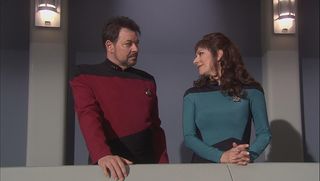
The Trek Franchise
Weve left this till last, because we know many of you will be clicking through this feature thinking, So when do we get to Brannon Braga?
Technically, though, Treks foremost purveyor of technobabble and blue fuzzy anomalies never actually ruined a show as a replacement showrunner. Voyager was pretty uniformly-dull-but-with-moments-of-okayness from start to end; he certainly didnt ruin it. Enterprisehe launched.
But, yes, he was instrumental in the gradual attrition of the franchise with his endlessly regurgitated time-travel stories and leaden dialogue, so maybe he deserves an honorary mention.
Oddly, Enterprise did have a replacement showrunner for the final couple of seasons, Manny Coto, who, most fans agreed, made a very good job of improving the show. Sadly, general audiences didnt seem to agree if the ratings were anything to judge by.
The Total Film team are made up of the finest minds in all of film journalism. They are: Editor Jane Crowther, Deputy Editor Matt Maytum, Reviews Ed Matthew Leyland, News Editor Jordan Farley, and Online Editor Emily Murray. Expect exclusive news, reviews, features, and more from the team behind the smarter movie magazine.

